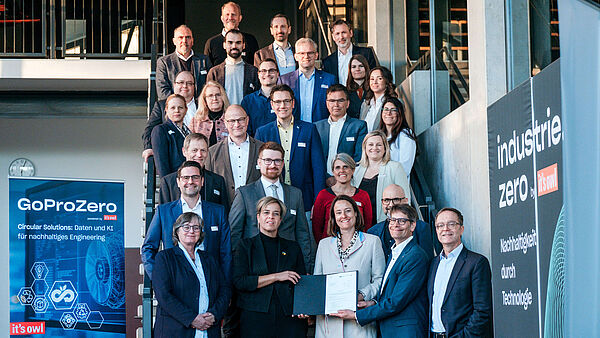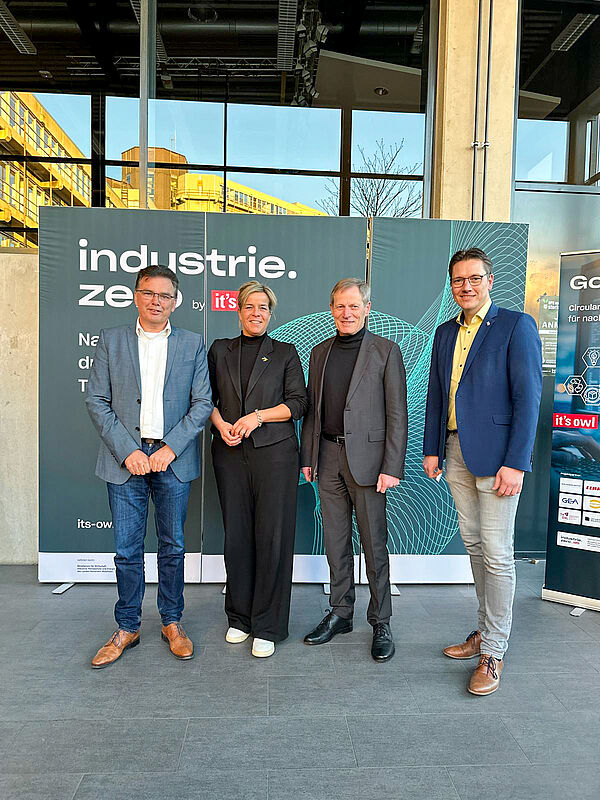In the face of increasingly stringent regulations, dwindling resources and growing societal demand for sustainability, the circular economy offers effective solutions to these challenges. It helps companies to extend product life cycles, close material loops and reduce dependence on scarce raw materials. However, the transition to circular business models is a significant challenge. This is precisely where the ‘GoProZero’ project of the it's OWL competence network comes in, which is being supported with funding of around four million euros from the Ministry of Economic Affairs, Industry, Climate Protection and Energy.
With 'GoProZero', it's OWL offers companies and research institutions in Ostwestfalen-Lippe an ideal platform for the development of innovative digital technologies and sustainable business strategies. The project aims to support regional companies in adapting their business models to circular and resource-efficient products in order to facilitate the transition to an effective circular economy. inIT plays a central role in achieving these goals. The research group 'Networked Automation Systems', led by Prof. Dr. Henning Trsek, is particularly involved in the development of lifecycle data management.
Minister Mona Neubaur emphasises the importance of technological innovation for climate protection
The project consortium recently met in Paderborn, where Mona Neubaur, Minister for Economic Affairs, Industry, Climate Action and Energy of the State of North Rhine Westphalia, personally handed over the funding decision and emphasised the importance of the project for the region: “Climate protection needs technology, and this is happening in North Rhine-Westphalia. With practical IT tools and digital solutions, the 'GoProZero' project strengthens competitiveness and shows how ecological responsibility and economic success go hand in hand. The transition to a circular economy is no longer a topic for the future - it is an urgent necessity. North Rhine-Westphalia is taking the lead as a leading region for the circular economy and sustainable industrial development. This creates new jobs, strengthens the competitiveness of our companies and protects the climate.”
Lighthouse projects and key themes of GoProZero
The research results will be implemented in six lighthouse projects in close cooperation with leading companies in the region. The aim is to develop practical approaches and IT tools that can be adopted by other companies in the long term.
Use of AI and digital twins
An important component of the project is the use of digital technologies such as digital twins, which optimise the entire lifecycle of a product right from the planning stage. By linking data from development, production and use, informed decisions can be made to conserve resources. Artificial intelligence will also help to analyse complex data and develop sustainable products more efficiently.
inIT develops lifecycle data management
The inIT research group 'Networked Automation Systems', led by Prof. Dr Henning Trsek, is largely responsible for the development and implementation of lifecycle data management. This technology enables comprehensive data analysis over the entire life cycle and thus contributes to the development of recyclable products. This technology is to be trialled in practice in collaboration with CLAAS and DENIOS SE.
"This project is particularly valuable for us as it strengthens our close cooperation with numerous partners from science and industry in our region. We look to the future with optimism and expectation and are happy to contribute our expertise to develop innovative solutions together," says Prof. Dr. Henning Trsek.
You can read more about GoProZero, detailed insights into the lighthouse projects and detailed information about all 14 project partners from science and industry in the it's OWL press release: https://its-owl.de/news-events/news/goprozero-neues-its-owl-projekt-unterstuetzt-unternehmen-bei-der-entwicklung-nachhaltiger-produkte/



